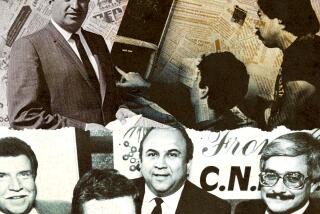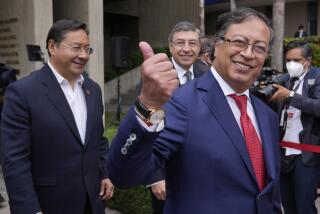Colombian Media Brace for Muzzle
- Share via
SAN SALVADOR — The 1994 presidential and congressional elections were the most closely scrutinized in Colombian history--not by international observers, but by the Colombian media.
Bolstered by constitutional reforms ensuring media freedom, television, radio and newspapers aggressively covered political campaigns and their financing. They kept up their coverage years after the polls closed, as prosecutors unraveled evidence that millions of dollars in drug money had found their way into campaign coffers.
So what will Colombian reporters do for an encore as this year’s national elections approach? Many observers fear that they will be pulling at their chains and trying to rip off their muzzles.
A combination of government actions and corporate takeovers has generated fears that Colombia’s media are being pulled off the story, just in time for the general elections in May.
Last year, government regulators refused to renew the licenses of several aggressive television newscasts, such as QAP, which relentlessly pursued the ties between narcotics traffickers and politicians.
The state-run network moved the newscast produced by relatives of opposition candidate Andres Pastrano to late at night, costing it viewers.
Even more worrisome for many Colombians, Grupo Bavaria, Colombia’s fifth-largest corporation, has been buying up media properties. Bavaria owns the weekly newsmagazine Cromos and a 50% stake in the radio news station Radio Net. It recently bought controlling interest of Caracol, another news radio station, and El Espectador, Colombia’s second-largest newspaper.
In addition, Bavaria successfully bid late last year for one of Colombia’s two newly privatized television networks. Another conglomerate, Organizacion Ardilla Lulle, won the other channel.
*
Bavaria, which began as a brewery operator, says the acquisitions are part of a diversification strategy that also included buying a bank.
Critics fear the purchases are a more subtle form of control by the powerful Santo Domingo family, the major owners of Bavaria.
“This is the greatest threat to Colombian journalism today,” said Javier Dario Restrepo, director of the Foundation for Press Freedom in Colombia.
Restrepo said he believes that the corporations are trying to use the media to influence public opinion. “For them, communications media are not important as a business, as a source of profits,” he said, noting a recent foundation study showing that media companies are far less profitable than other industries.
*
Mauricio Vargas, a journalist at Radio Net and a columnist for Cromos, brushes aside such fears of interference.
“Listeners and readers are the main witnesses that I have been able to report what I wanted [on the radio] and give any opinion I cared to” in the magazine, he said. But other journalists worry about the Santo Domingo family’s intentions. Popular cartoonist Hector Osuna and investigations editor Ignacio Gomez led the stampede of journalists leaving El Espectador when the Grupo Bavaria purchase was announced.
Even those who remained, such as columnist Fabio Castillo, Colombia’s top reporter on the drug mafia, are concerned.
“The press is coming under the control of industrial groups,” he said. “We have freedom of expression without the right to say things that make powerful people uncomfortable.”
More to Read
Sign up for Essential California
The most important California stories and recommendations in your inbox every morning.
You may occasionally receive promotional content from the Los Angeles Times.












